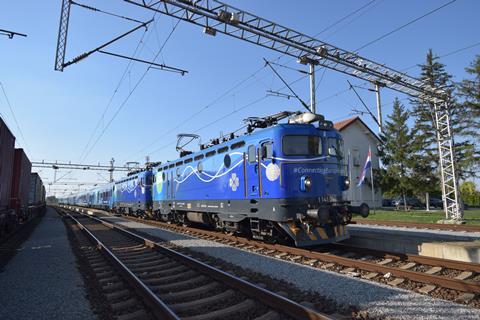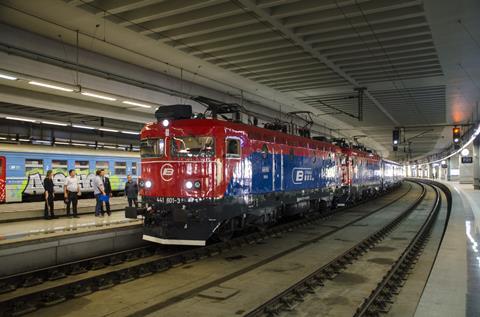
EUROPE: Welcoming the EU’s Connecting Europe Express to Beograd Centar on September 13, Serbian Prime Minister Ana Brnabić announced that her country’s rail investment programme would be worth up to €6bn and focus on ‘reconnecting’ the Western Balkan countries’ fragmented networks.
‘We have invested more than €600m into railways since 2014’, she said after visiting the special train, which is on a five-week tour of Europe totalling more than 20 000 km. Serbia’s current priorities are to complete the reconstruction of the Beograd – Budapest corridor under a programme worth around €2bn, and the wider development of EU Corridor X. This project is costed at around €2bn and is being co-funded by the EU through the European Development Bank and the investment fund for the Western Balkans.
Future on Tracks
To mark the visit of the Connecting Europe Express to Beograd, a rail summit was held on September 13 entitled ‘The Future is on Tracks’. This was organised by Transport Community, an EU-backed intergovernmental body with a remit to study how the Western Balkan countries could be better integrated into the European transport network. The organisation has a permanent secretariat in Beograd.
Representatives of the six Western Balkan states (Albania, Bosnia & Herzegovina, Kosovo, Montenegro, North Macedonia and Serbia) signed a joint ‘Dedication to Rail’ at the summit, intended to signal their backing for better rail links across the region and to celebrate the EU’s Year of Rail.

Opening the summit, TC Director-General Matej Zakonjšek said he hoped the event would ‘create momentum to introduce positive change’ with a focus on investment in rail transport, ‘as the investments will make rail travel attractive for the passengers and business in the region’.
This would be achieved by addressing two strategic issues, he suggested: the adoption of technical standards to facilitate interoperability, and the injection of stable funding streams to refresh the railway infrastructure, much of which is in a dilapidated state.
Another commitment to rail was provided by Nandita Parshad, Managing Director of the Sustainable Infrastructure Group at the European Bank for Reconstruction & Development.
‘The EU, EBRD and EIB are providing well-structured and affordable finance for the development of railways’, she insisted. ‘As the world is turning to greener and more responsible modes of transport, and with finance available, now is the opportunity for the Western Balkans countries to invest in their railways.’
Representing the European Commission, DG Move Deputy Director-General Maja Bakran Marčić reported that funding worth up to €30bn had been allocated for sustainable transport and rail infrastructure projects in the EU, and that this financing stream would also apply to the Western Balkan region.
‘We are going to improve the lines from Zagreb to Beograd and from Beograd to Skopje, and we are already involved in the joint modernisation of railway line between Serbia and Bulgaria’, she confirmed.
Balancing competing priorities
However, CER Executive Director Alberto Mazzola sounded a note of caution, arguing that there was a ‘delicate balance’ to be kept in the region between the sometimes contrasting needs of passenger and freight operations, and the extent to which EU-style market liberalisation should be embraced.
‘We must protect services that are usually not commercially viable’, he told the summit. ‘Such a situation has to be resolved through public service obligation agreements.’
Mazzola agreed that better rail links in the Balkans would help improve trading links further afield, especially to Turkey and the Middle East. ‘We must take every opportunity to remind the EU institutions that the TEN-T network should also include the Balkan route’, he urged.
Following its departure from Beograd, the Connecting Europe Express headed for Greece via North Macedonia. On the journey between Tabanovtse and Skopje, North Macedonia’s Minister of Transport Blagoj Bochvarski and Hari Lokvenec, Director-General of ŽRSM Infrastruktura, joined the train to highlight rail investment in their country. The top priority is to complete a rail link between the centre of Skopje and the city’s international airport, they explained.

















